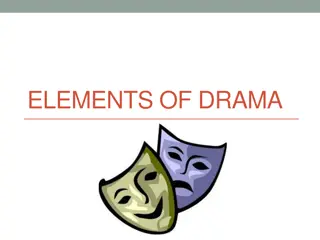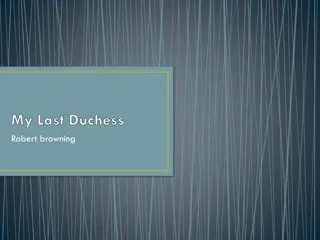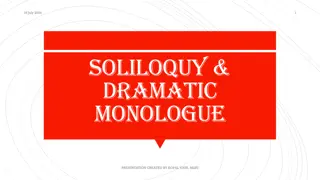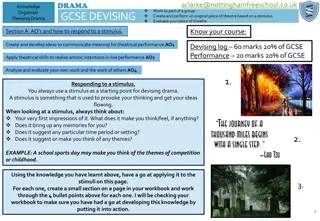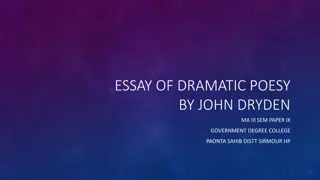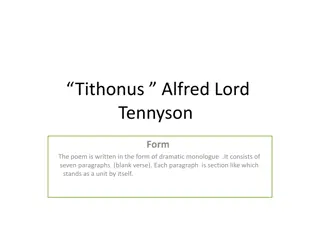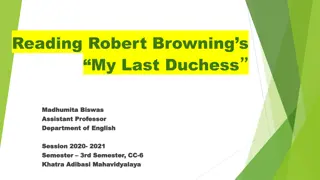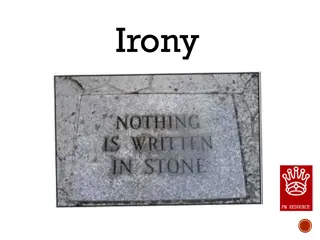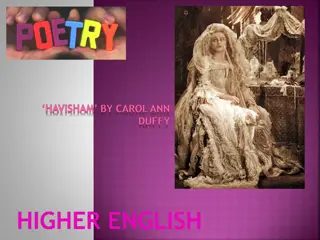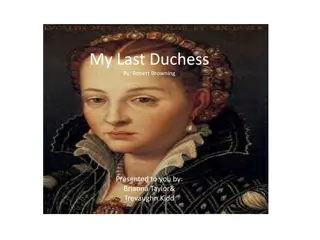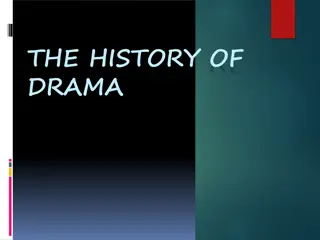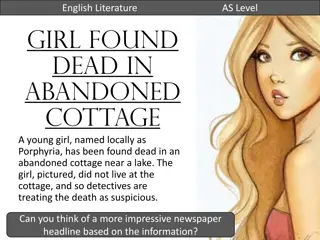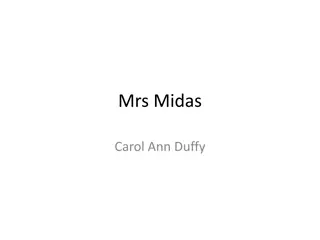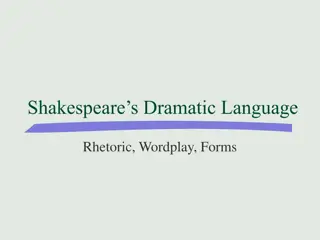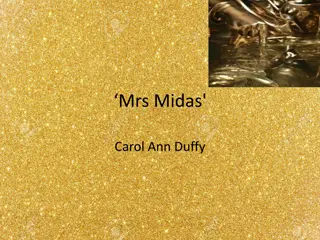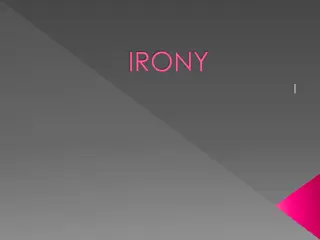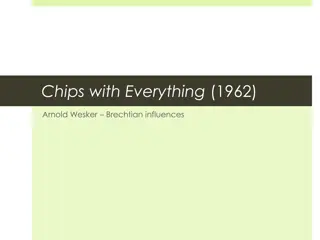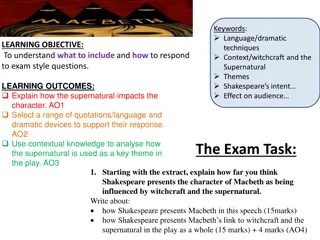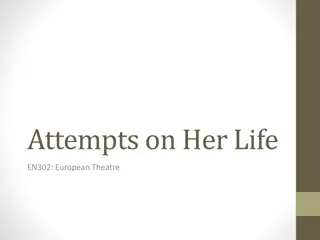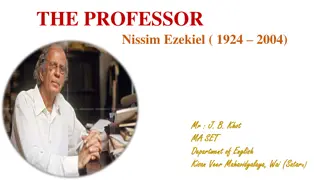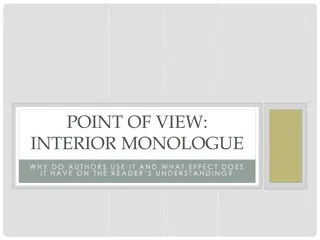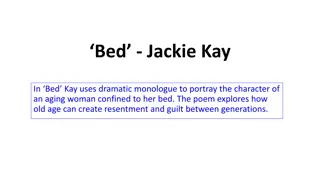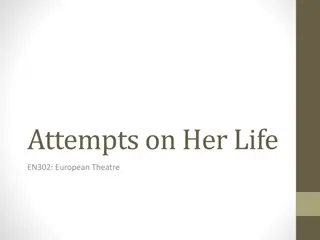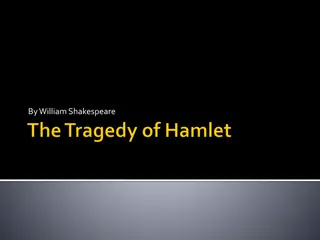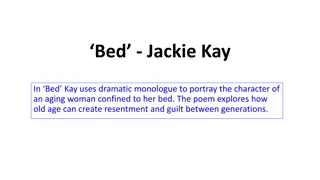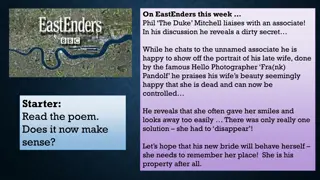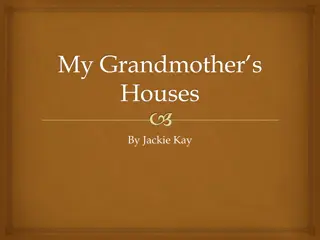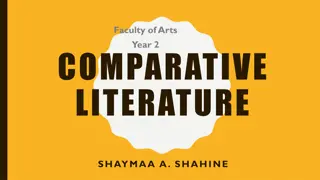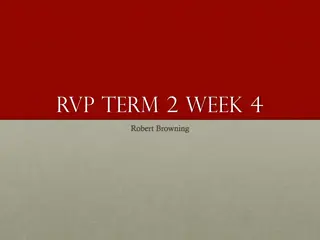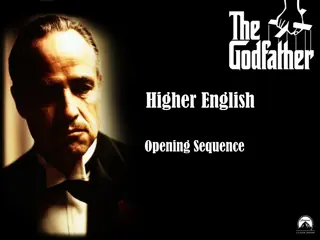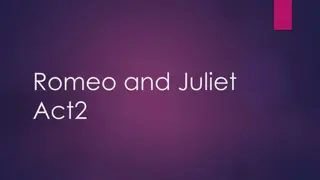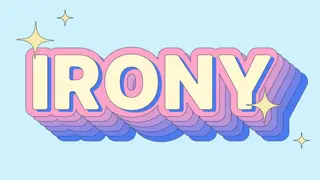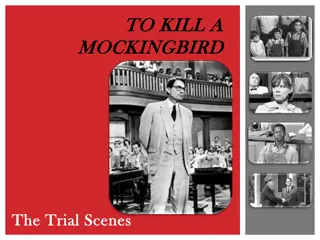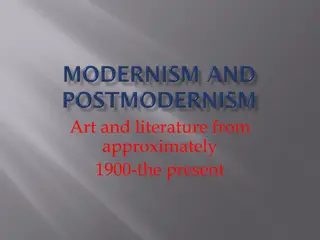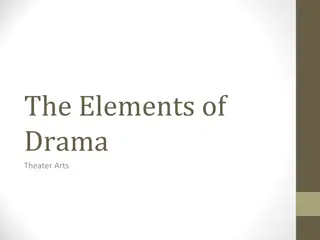Understanding the Elements of Drama and Theater History
Drama, originating from the Greek verb "dran," involves acting and storytelling in front of an audience. Explore the key aspects, from the Globe Theater in London to dramatic structure, actors, and speech forms like dialogue and monologue. Learn about the crucial components such as playwrights, acto
4 views • 22 slides
Analysis of "My Last Duchess" by Robert Browning
The poem "My Last Duchess" by Robert Browning portrays the Duke of Ferrara showcasing a painting of his late Duchess to a visitor. Through the Duke's words, we uncover his controlling and possessive nature, highlighting his manipulation and jealousy over the Duchess's innocent demeanor. The Duke's r
0 views • 19 slides
Understanding Soliloquy and Dramatic Monologue in Literature
A soliloquy is a form of monologue where a character speaks to themselves, the audience, or a surrogate, revealing inner thoughts. This presentation explores different types of soliloquies and their significance in literary works, including examples from Shakespeare's Hamlet. Additionally, it delves
0 views • 9 slides
Devising Drama - GCSE Knowledge Organiser
This GCSE Drama Knowledge Organiser provides guidance on devising and performing an original piece of theatre based on a stimulus. It covers how to respond to stimuli, develop ideas for theatrical performances, apply theatrical skills, analyze and evaluate work, and rehearse and refine the devised p
0 views • 10 slides
Debate on Dramatic Poesy by John Dryden
John Dryden's work "Essay of Dramatic Poesy" is a dialogue among four speakers that debates the merit of classical versus modern drama, the comparison between French and English drama, and the use of rhyme in plays. Each speaker presents arguments showcasing their perspectives on these topics, revea
0 views • 5 slides
Immortal Longing: Analysis of Tithonus by Alfred Lord Tennyson
The dramatic monologue "Tithonus" by Alfred Lord Tennyson explores the consequences of immortality without eternal youth. The poem delves into Tithonus' anguish as he continues to age while his beloved Aurora remains eternally youthful. Tithonus, trapped in cruel immortality, yearns for release from
0 views • 5 slides
Understanding "My Last Duchess" by Robert Browning - Analysis and Interpretations
This analysis delves into the dramatic monologue "My Last Duchess" by Robert Browning, exploring themes of power, control, and possession through the Duke's chilling narrative about his late wife. The in-depth examination reveals the Duke's possessive nature, shedding light on societal expectations
6 views • 8 slides
Understanding Irony in Verbal, Dramatic, and Situational Contexts
Explore the nuances of verbal, dramatic, and situational irony through examples and explanations. Verbal irony involves saying something different from what is meant, often using humor like puns. Dramatic irony occurs when the audience knows something the characters don't, creating suspense. Situati
0 views • 12 slides
Exploring Carol Ann Duffy's Poem "Havisham
Dive into the analysis of the Carol Ann Duffy poem "Havisham" in these lessons. Discover the use of monologue, themes discussed, and poetic techniques. Explore the background of the character Miss Havisham from Charles Dickens' novel, and unravel the emotions and story behind the poem. Learn how to
0 views • 28 slides
The Art of Dramatic Writing: Exploring Character Development and Dialectical Approach
Every object and human has multiple dimensions that influence character development in dramatic writing. Understanding the physiological, sociological, and psychological aspects, along with the impact of the environment and dialectical approach, shapes characters' growth and decisions in storytellin
0 views • 12 slides
Analysis of "My Last Duchess" by Robert Browning: Themes and Tones
My Last Duchess" by Robert Browning delves into themes of power, language, arts, culture, madness, and jealousy through the dramatic monologue of the Duke of Ferrara as he reveals his controlling and sinister nature in discussing his late wife. Browning uses rich imagery and subtle language choices
0 views • 7 slides
Exploration of Various Poetry Forms: Descriptive, Narrative, Dramatic, and Metaphysical
Poetry is a diverse art form encompassing descriptive portrayal, storytelling narratives, engaging dialogues, and profound metaphysical insights. Descriptive poetry vividly captures objects and scenes like paintings, narrative poetry weaves interconnected stories, dramatic poetry involves dialogues,
0 views • 11 slides
The Evolution of Drama: A Historical Journey
Drama, originating from ancient Greece, has evolved through the centuries from being a genre of poetry to a distinct theatrical form encompassing tragedy, comedy, and more. The masks of Thalia and Melpomene symbolize the essence of comedy and tragedy, while the Great Dionysia festival in Athens hono
0 views • 41 slides
Understanding Dramatic Monologue in Poetry through "Havisham
Dramatic monologue in poetry is a form where a solitary speaker addresses an audience, offering insight into a character's thoughts and emotions. This exploration often reveals complexities, conflicting viewpoints, and hidden truths. Through examining the character of Miss Havisham from Charles Dick
1 views • 43 slides
Mystery Unraveled: The Tragic Tale of Porphyria's Lover in Abandoned Cottage
A young girl named Porphyria is found dead in an abandoned cottage near a lake, sparking suspicion and the need for a detective to solve the murder mystery. The dramatic monologue "Porphyria's Lover" by Robert Browning is examined, delving into themes of love, obsession, and madness. Independent lea
0 views • 12 slides
Analysis of "Mrs. Midas" by Carol Ann Duffy
In the poem "Mrs. Midas" by Carol Ann Duffy, the classical myth of King Midas is reimagined in a modern setting, focusing on Mrs. Midas's perspective. The poem humorously explores themes of greed, selfishness, and the triviality of material wealth. The style is a dramatic monologue, portraying Mrs.
1 views • 59 slides
Exploring Shakespeare's Dramatic Language and Themes
Shakespeare's dramatic language entails rhetoric, wordplay, and rich forms that offer both pleasure and challenges to readers. His verse showcases density and richness, with characters expressing thoughts through powerful metaphors and figurative language. Examples from "Macbeth" illustrate how imag
0 views • 40 slides
Analysis of "Mrs. Midas" Poem: Themes, Structure, and More
The poem "Mrs. Midas" by Carol Ann Duffy explores themes of loneliness, greed, and the consequences of our actions through the dramatic monologue of a persona based on the myth of King Midas. The structure of the poem, with irregular stanzas reflecting chaotic life changes, delves into the damaging
0 views • 16 slides
Analysis of 'Mrs. Midas' by Carol Ann Duffy: Form, Structure, and Symbolism
In Carol Ann Duffy's poem "Mrs. Midas," a modern take on the myth of King Midas, the speaker, Mrs. Midas, reflects on her life with a husband whose touch turns everything to gold. The poem is a dramatic monologue, delving into themes of isolation, desire, and the consequences of unchecked power. Thr
0 views • 21 slides
Understanding Irony: Verbal, Dramatic, and Situational Examples
Dive into the world of irony with examples of verbal, dramatic, and situational irony explained through scenarios like sarcastic comments, horror movie twists, and unexpected encounters. Explore how irony adds layers of meaning and depth to storytelling, from characters knowing more than others to o
0 views • 10 slides
Epic Theatre and Brechtian Influences in Modern Drama
Epic theatre, influenced by Bertolt Brecht, challenges traditional Aristotelian and Hegelian dramatic structures by emphasizing critical engagement and distancing strategies. It uses historical narratives and didactic elements to provoke social consciousness and active spectator participation, contr
0 views • 26 slides
Shakespeare's Portrayal of Macbeth's Interaction with Witchcraft and the Supernatural
Shakespeare explores Macbeth's deepening connection to witchcraft and the supernatural through a compelling dramatic monologue where Macbeth grapples with a hallucination of a dagger. This extract delves into Macbeth's internal turmoil, hinting at the influence of supernatural forces on his actions
0 views • 22 slides
Exploring European Theatre Traditions
European theatre traditions, as discussed through Lehmann's Postdramatic Theatre and Aristotle's dramatic elements, highlight the unique characteristics that differentiate them from non-European traditions. Concepts such as hamartia, anagnorisis, and mimesis are explored along with the rejection of
0 views • 30 slides
The Professor Nissim Ezekiel - A Satirical Poem on Indian Professors
The Professor is a satirical poem written by Nissim Ezekiel that humorously portrays a typical Indian professor named Professor Seth boasting about his family and mispronouncing words. Ezekiel's subtle and well-crafted diction shines through this dramatic monologue. The poem, awarded the Sahitya Aka
0 views • 7 slides
Understanding the Use of Interior Monologue in Literature
Authors utilize internal monologues to provide insights into characters' thoughts, emotions, and reactions. By exploring examples from works like "The Shining" and "Discovery," readers can grasp how interior monologues enhance storytelling by revealing inner conflicts and character development.
0 views • 7 slides
Analysis of "Bed" by Jackie Kay: Themes and Structure
Bed" by Jackie Kay is a dramatic monologue depicting an elderly woman's feelings of confinement, dependency, and reflections on time and relationships. Through the use of Scots language, the poem delves into themes of aging, resentment, and guilt between generations. The structured quatrains mirror
0 views • 34 slides
European Theatre: Exploring Dramatic Elements and Themes
European theatre has a rich history and tradition that distinguishes it from other global theatre practices. From Aristotle's dramatic elements to the conflicts faced by characters like Antigone and Creon, this form of theater delves into themes of recognition, imitation, and conflict. Hans-Thies Le
0 views • 35 slides
Shakespearean Dramatic Techniques Analysis
Explore the intricate use of monologues, soliloquies, structural divisions, and emotional responses in William Shakespeare's plays. Delve into the dialogues between characters like Hamlet, Gertrude, and Claudius to uncover themes of love, madness, and expectation. Discover how Shakespeare utilizes d
0 views • 23 slides
Analysis of "Bed" by Jackie Kay: Themes, Form, and Use of Scots
Bed" by Jackie Kay is a dramatic monologue portraying the perspective of an elderly woman confined to her bed, exploring themes of aging, resentment, and guilt between generations. The poem uses Scots to add immediacy to the narrative, highlighting the woman's reliance on her daughter and contemplat
1 views • 34 slides
Analyzing "My Last Duchess" by Robert Browning
Explore how Browning uses language and structure to portray the Duke's character in relation to the Duchess in the poem "My Last Duchess." Delve into the historical context and significance of the title change. Uncover the chilling portrayal of control and possession in the dramatic monologue as the
0 views • 13 slides
Memories of My Grandmother's Houses
The monologue in "My Grandmother's Houses" by Jackie Kay vividly explores the intimate relationship between a granddaughter and her grandmother as they navigate different stages of life in varying living environments. Through descriptive prose, the poet paints a poignant portrait of nostalgia, famil
0 views • 25 slides
Exploring Character Creation and Dramatic Conventions in Drama Class
Using a short piece of text as a stimulus, students in a drama class dive into creating characters and exploring dramatic conventions to craft scenes depicting different aspects of their characters' lives. The story unfolds in Hell's Alley, where tension and conflict shape the protagonist's experien
0 views • 10 slides
Exploring Dramatic Forms: From Burlesque to Well-Made Plays
Dive into the world of dramatic forms, where Burlesque emerged in Medieval Drama and was revived in the Seventeenth Century to satirize serious works. Learn about high burlesque that parodies literary works like Alexander Pope's "The Rape of the Lock" and low burlesque that mocks serious subjects. D
0 views • 9 slides
Analysis of Robert Browning's Dramatic Monologues and Implied Audience
In this content, we delve into the elements found in the dramatic monologues of Robert Browning, focusing on implied addressees, ideal recipients, and the implications of the dramatic form on the relationship between speaker, addressee, and reader. We explore how the presence of an implied audience
0 views • 5 slides
Analysis of Key Elements in the Opening Sequence of "Higher English
The opening sequence of "Higher English" delves into the intricate themes of control, power, deception, and the clash between Italian tradition and American values. Through the characters and dialogues, the sequence explores concepts of justice, violence, crime, corruption, honor, family, and the Am
0 views • 23 slides
Analysis of Literary Devices in Romeo and Juliet Act 2
In Act 2 of Romeo and Juliet, the characters use various literary devices such as allusion, dramatic irony, hyperbole, and foreshadowing. Mercutio mistakenly believes Romeo is still in love with Rosaline, showcasing dramatic irony. Additionally, Friar Lawrence's words foreshadow the danger in Romeo
0 views • 10 slides
Understanding Irony: Types, Purpose, and Examples
Irony is about expectations and contrast between reality and what is being said. It can add interest, depth, suspense, and humor to texts. The three types of irony are verbal, dramatic, and situational, each serving a unique purpose to engage the audience. Examples from popular stories like Beauty a
0 views • 12 slides
Perspectives on the Trial of "To Kill a Mockingbird
Explore the trial scenes and monologues from the iconic book "To Kill a Mockingbird" by Harper Lee. Dive deep into characters' perspectives, including Atticus Finch's closing speech, and create a unique monologue reflecting the experience of one character. Use Google Street View to envision the cour
0 views • 7 slides
Exploring Art and Literature from 1900 to the Present
Novels, plays, and poetry saw a resurgence post-Whitman and Dickinson, with writers experimenting with unique styles like interior monologue and stream of consciousness. Characters chased the American dream, expressing admiration for America as a land of opportunity. The Modernism movement reflected
0 views • 13 slides
Understanding Drama: The Art of Theater Expression
Drama, originating from the Greek word "Dran" meaning to act, is a form of storytelling performed in front of an audience. It differs from prose and poetry by providing a unique experiential aspect through live enactments. Essential elements such as playwrights, actors, acts, scenes, and dramatic sp
0 views • 15 slides
